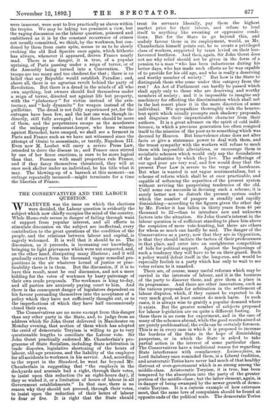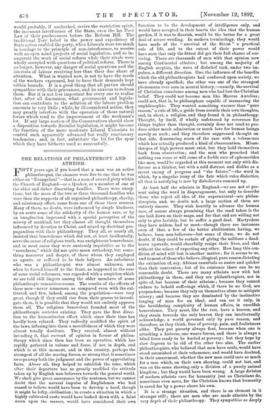THE CONSERVATIVES AND THE LABOUR QUESTION.
WHATEVER was the issue on which the elections were decided, the Labour question is evidently the subject which now chiefly occupies the mind of the country. While Home-rule seems in danger of failing through want of support from popular interest, and all efforts to stimulate discussion on the subject are ineffectual, every contribution to the great questions of the condition of the people, and the relations between labour and capital, is eagerly welcomed. It is well that it should be so. The discussion, as it proceeds, is increasing our knowledge, bringing to light grievances which were not suspected, and, on the other hand, dissipating many illusions ; and it will gradually extract from the thousand vague remedial pro- positions in the air whatever kernel of justice or prac- ticability there is in them. But the discussion, if it is to have this result, must be real discussion, and not a mere bidding for the votes of workmen by hasty patronage of their own crude proposals. The workman is king to-day, and all parties are anxiously paying court to him. And there is the consequent danger of legislators dependent on his favour persuading themselves into the acceptance of a policy which they have not sufficiently thought out, or to the imperfections of which they have half unconsciously closed their eyes.
The Conservatives are no more exempt from this danger than any other party in the State, and, to judge from an address which Sir John Gorst delivered in Manchester on Monday evening, that section of them which has adopted the creed of democratic Toryism is willing to go to very questionable lengths to conciliate the Labour vote. Sir John Gorst practically endorsed Mr. Chamberlain's pro- gramme of State Socialism, including State arbitration in trade disputes, legislative shortening of the hours of labour, old-age pensions, and the liability of the employer for all accidents to workmen in his service. And, according to the report in the Standard, he went far beyond Mr. Chamberlain in suggesting that "the employs in the dockyards and arsenals had a right, through their votes, to insist upon this reduction (to an eight-hours day), if they so wished it, or a limitation of hours of labour in all Government establishments." In that case, there is no reason why they should not proceed, through their votes, to insist upon the reduction of their hours of labour to four or five. It is right that the State should treat its servants liberally, pay them the highest market price for their labour, and refuse to lend itself to anything like sweating or oppressive condi- tions. But for the State to go beyond this, and unduly favour those in its employment, would, as Mr. Chamberlain himself points out, be to create a privileged class of workers, supported by taxes levied on their less- favoured brethren. And then, again, Sir John Gorst does not see why relief should not be given in the form of a pension to a man "who has been industrious during his better days, who has made such efforts as he was capable of to provide for his old age, and who is really a deserving and worthy member of society." But how is the State to distinguish those who come under this category from the rest ? An Act of Parliament can hardly be passed which shall apply only to those who are deserving and worthy members of society ; and it is impossible to imagine any machinery for effecting the discrimination which shall not in the last resort place it in the mere discretion of some individual. We sympathise thoroughly with the benevo- lent spirit which usually prompts such shadowy proposals,. and disguises their impracticable character from their authors. It is a great advance on the spirit of cold indif- ference, in which a previous generation too often resigned itself to the miseries of the poor as to something which was decreed by Heaven. But benevolence alone does not alter facts or give a statesman power to deal with them, and the truest sympathy with the workers will refuse to mock them with impossible alleviations, or encourage them in socialistic schemes which would only sap the foundations. ofthe industries by which they live. The sufferings of our aged poor are very real, and few would deny that the present Poor Law is severe to the verge of harshness. But what is wanted is not vague sentimentalism, but a scheme of reform which shall be at once practicable, and capable of softening the asperities of the present system without reviving the pauperising tendencies of the old. Until some one succeeds in devising such a scheme, it is surely better not to disturb the present system under which the number of paupers is steadily and rapidly diminishing—according to the figures given the other day by Mr. Fowler it has fallen in thirty years from 46 per thousand to 22—than to introduce new and unknown factors into the situation. Sir John Gorst's interest in the labour question is of sufficient standing to place him above the suspicion of mere vote-hunting, but there are others for whom so much can hardly be said. The danger of the- Conservatives as a party, now that they are in Opposition, is that they should imitate the tactics of their predecessors in that place, and enter into an unrighteous competition of bids for political support. Against the beginnings of such a tendency they will have to be on their guard. Suck a policy would defeat itself in the long-run, and would be especially foolish in a party which has only to wait to see votes return to it unasked.
There are, of course, many useful reforms which may be carried in the interests of labour, and it is the business- of the party to discover these, and give them a place in its programme. And there are other innovations, such as the various proposals for arbitration in the settlement of labour disputes, which, if they cannot be expected to do very much good, at least cannot do much harm. In such cases, it is always wise to gratify a popular demand where it exists. But the greater number of subjects proposed for labour legislation are on quite a different footing. In these there is no room for experiment, and in the case of many of the schemes abroad, while the good results aimed at are purely problematical, the evils can be certainly foreseen. This is so in every case in which it is proposed to increase the burdens of the State in the hope of diminishing pauperism, or in which the State is asked to take partial action in the interest of some particular class. The Conservatives have a traditional reason for regarding State interference with complacency. Laissez-faire, as Lord Salisbury once reminded them, is a Liberal tradition, and aristocratic Tories have never had much of that healthy distrust of over-government which is so strong among the middle-class. Aristocratic Toryism, it is true, has been tempered by the absorption into the party of the greater portion of the middle-class ; but the latter element, again, is in danger of being swamped by the newer growth of demo- cratic Toryism. It is a curious example of how extremes meet, that the same love of compulsion should be found at .opposite ends of the political scale. The democratic Tories would probably, if unchecked, revive the restrictive spirit, the incessant interference of the State, even the lax Poor Law of their predecessors before the Reform Bill. The traditional Tory belief in the power and expediency of State action enabled the party, when Liberals were too much in bondage to the principle of non-interference, to receive with an open mind projects of social legislation, and so in- augurate the work of social reform while their rivals were wholly occupied with questions of political reform. There is no longer, however, any danger of social questions and the interests of labour receiving less than their due share of attention. What is wanted now, is not to have the needs of the workers expressed, but to have their demands kept within bounds. It is a good thing that all parties should sympathise with their grievances, and be anxious to redress them. But it is not less important for every one to realise that, after all discussion, what government and legisla- tion can contribute to the solution of the labour problem amounts to very little ; while, by ill-considered action, they may greatly interfere with the operation of those natural forces which tend to the improvement of the workman's lot. If any large section of the Conservatives should show a disposition towards Socialist legislation, it might become the function of the more moderate Liberal Unionists to control such apparently advanced but really reactionary tendencies ; and, in fact, substitute the bit for the spur which they have hitherto used so successfully.







































 Previous page
Previous page